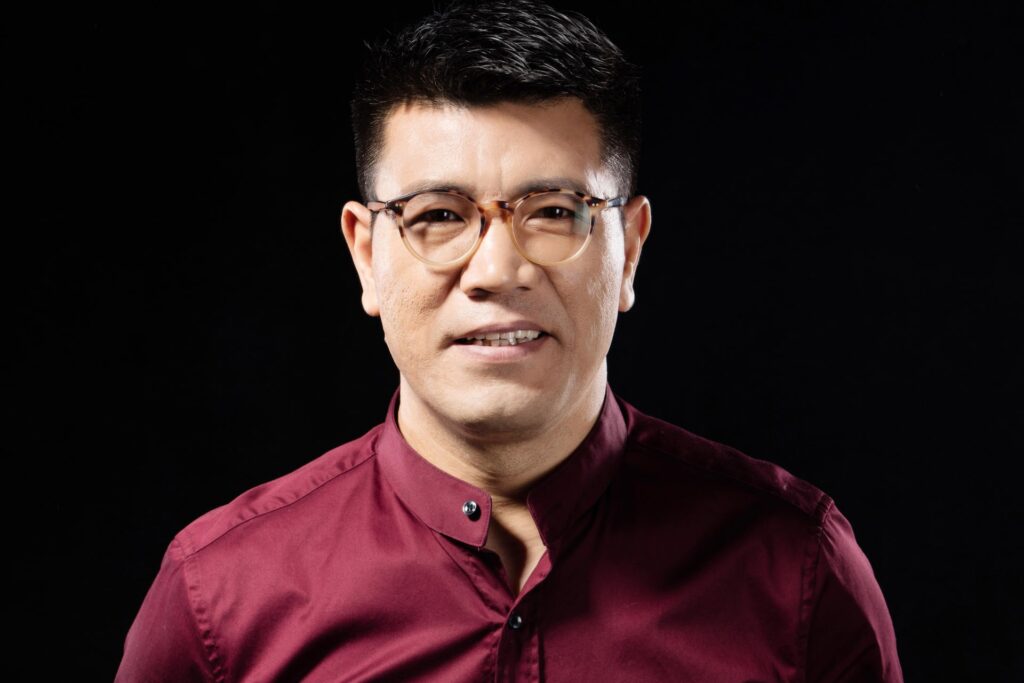23 years ago, Du Zhongbing made a promise to a friend that he never expected to define his life: to open a hotpot restaurant. Back then, he was busy making a fortune in crude iron and coke trading. Three years in, Du became his own boss, and the money flowed. By his calculations, he’d made enough to last a lifetime. But days filled with baths and mahjong left him uneasy, restless.
The decision to open a hotpot restaurant stemmed from a casual challenge over dinner. One evening, while eating hotpot, Du was astonished to find the vegetables still had mud on them, yet a long line stretched out the door. “These places should be out of business,” he thought. “One day, I’ll open my own hotpot restaurant.”
Although Du grew up not knowing much about hotpot, he took the plunge with serious intent. He moved to Chongqing, bought a house, and spent months there researching the history and culture of hotpot. When he opened his first three restaurants, Du was his own delivery driver, working himself to the bone every day. To improve his management skills, he even enrolled in an executive MBA program at Tsinghua University, balancing classes with running his budding business.
Hotpot is the crown jewel of Chinese cuisine, with a market value nearing RMB 1 trillion (USD 140 billion). But it’s also a brutal industry known for its high failure rates. A recent report by Tomato Capital revealed that, while there are 513,000 hotpot restaurants operating, the ratio of new openings to closures is almost 1:1, and only 58% of new restaurants survive their first year. Behind the booming opportunities lies a harsh reality.
Banu, the brand Du founded, is one of the rare survivors that has thrived in this environment. After expanding out of Henan in 2018 and entering first-tier cities, Banu has now opened stores in over 30 cities, including Beijing, Shanghai, and Shenzhen. Banu’s approach is more upscale than its better-known competitor Haidilao—Banu’s average per-person spend in Beijing is RMB 150 (USD 21), compared to Haidilao’s average of RMB 97.4 (USD 13.6).
Banu specializes in Sichuan- and Chongqing-style hotpot, the largest segment. According to Hongcan Big Data, Sichuan- and Chongqing-style hotpot accounts for nearly 40% of all hotpot restaurants, but those charging over RMB 150 per customer make up less than 4% of the market. Across the entire hotpot category, brands with more than 100 stores represent less than 0.5%.
While Banu’s store count is modest—about 140 locations, just 10% of Haidilao’s total—its approach stands out. Banu operates all its stores directly and has continued to expand, even amid a market downturn. The company opened 12 new locations in the first half of 2024, close to meeting its annual target. Meanwhile, other high-end chains struggled: CouCou, under Xiabu Xiabu, closed 23 stores in the first half of 2024, with sales down nearly 30% year-on-year. Haidilao also closed 43 stores in the same period.
Banu’s steady pace of expansion is a key part of its identity. “We didn’t grow like a balloon in the past, and we don’t need to artificially slow down now,” Du said. Except during the pandemic, Banu has maintained a consistent 20% annual growth rate.

Du follows what he calls the “three-flip rule,” meaning a restaurant must turn its tables over three times a day to generate an 8–10% profit margin. If it fails to meet that standard, it will struggle to break even. Du’s belief is that, when a hotpot restaurant with a per-person spend of RMB 200 (USD 28) only manages two table flips, it ends up cutting corners on ingredients to scrape by, which is unsustainable.
In 2023, Du faced a significant setback. His son launched a self-service hotpot venture, Mega Land, which soon found itself embroiled in a scandal after lamb was discovered to contain duck meat. Du swiftly stepped in, personally compensating customers with RMB 8.354 million (USD 1.2 million). This crisis led to a heartfelt discussion between father and son at a temple, after which his son joined Banu as a product manager. For Du, product development is a demanding but essential path to building a lasting brand.
An avid adventurer, Du practiced martial arts in his youth and took up hiking later in life. More recently, he’s developed a passion for paragliding, despite injuring his foot in the process. He’s particularly drawn to the sensation of descending and has found parallels between paragliding and running a business: the parachute represents the company, the lines symbolize team members, and the weather reflects the external environment. Managing these elements too tightly or loosely can lead to consequences.
One of the most valuable lessons Du learned from paragliding is that the hardest part isn’t taking off, but resisting the urge to fly when conditions aren’t right. “At one point, I really wanted to open more stores, but I had to hold back, calm myself, and just sit there cracking sunflower seeds, picking at my nails, waiting,” he told 36Kr. Today, Du has handed over the roles of general manager and product manager to others, focusing on being a mentor and advisor.
With the trend of restaurant brands going global, Du has been traveling the world, exploring Banu’s potential for international expansion. But he’s in no rush to take the leap. Entrepreneurship has taught him patience and calm—qualities at odds with his naturally fiery personality. “Even if I live to 90, I’ll always be at 90 degrees Celsius, ready to boil at any moment.”
KrASIA Connection features translated and adapted content that was originally published by 36Kr. This article was written by Yang Yafei for 36Kr.
